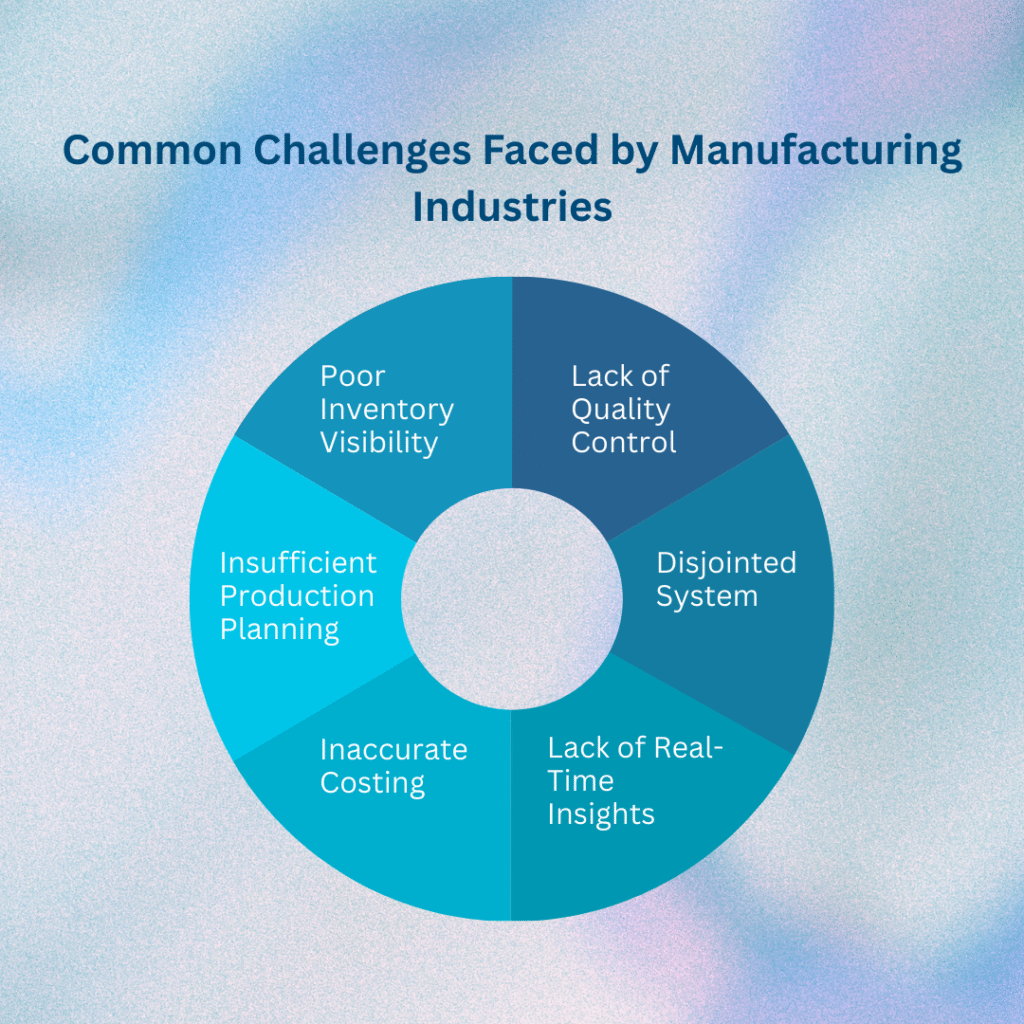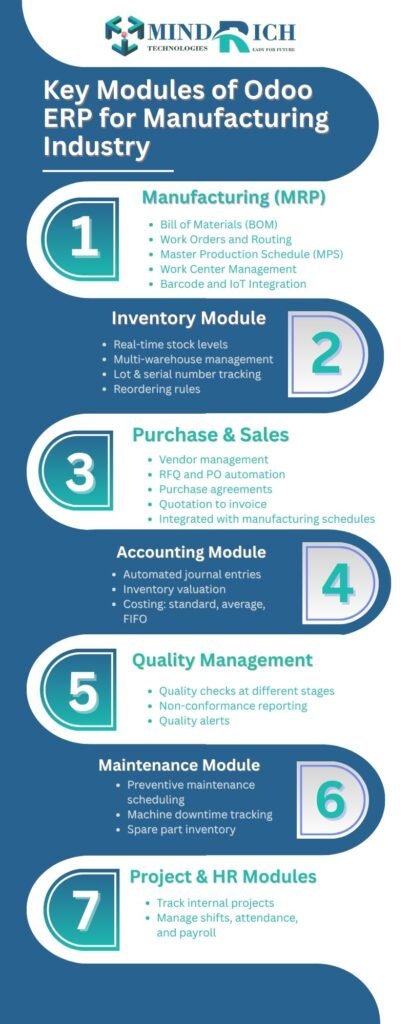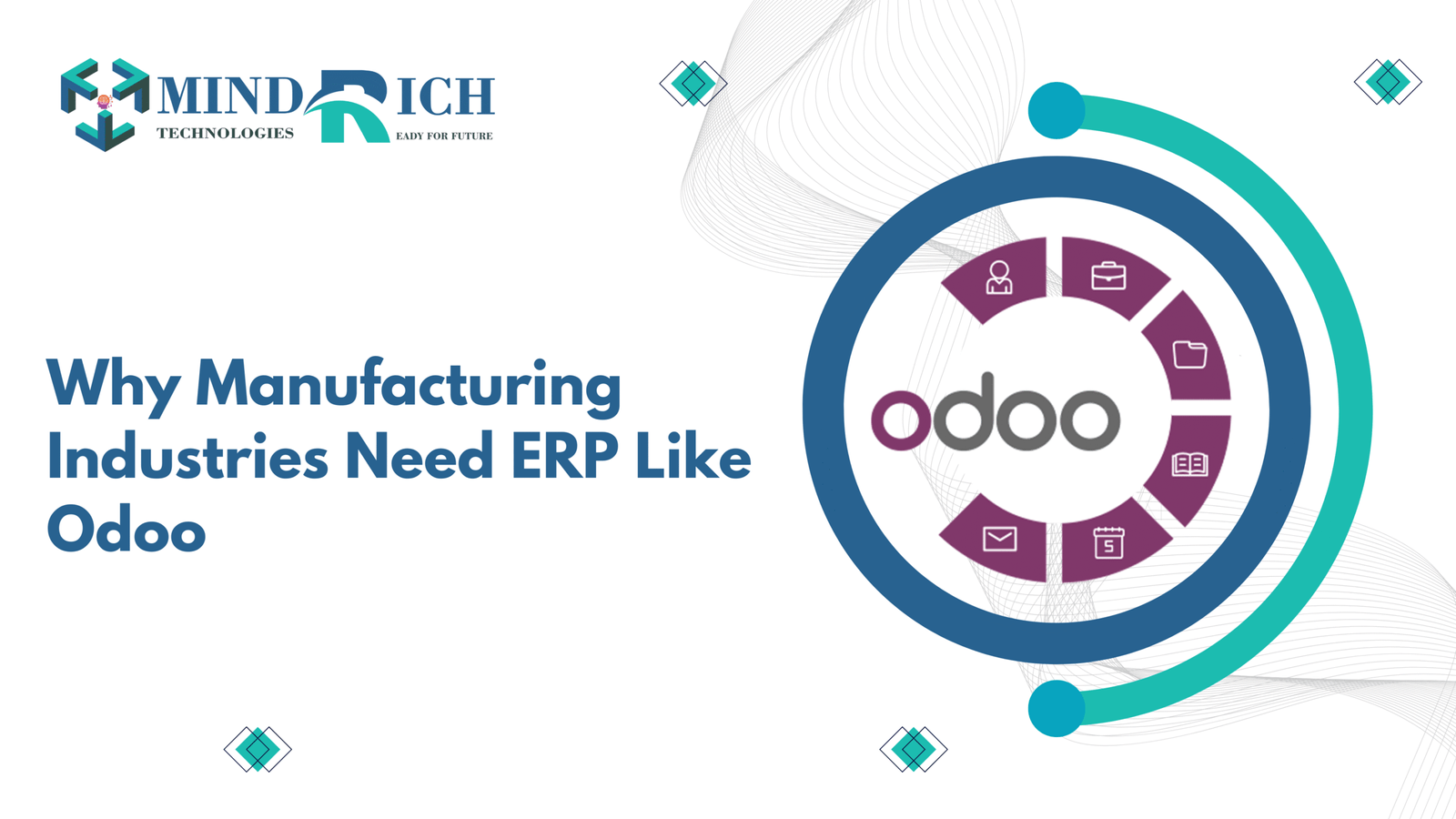Odoo ERP for manufacturing industry is revolutionizing how manufacturers operate globally. An integrated suite of programs known as an enterprise resource planning (ERP) system helps companies in automating and managing key functions like finance, HR, manufacturing, inventory, and procurement. Let’s look at ERP Software for manufacturing industries in detail.
Overview of Manufacturing ERP Software
An integrated suite of programs known as an enterprise resource planning (ERP) system aids companies in automating and managing key functions like finance, HR, manufacturing, inventory, and procurement.
ERP software, especially robust open-source solutions like Odoo Software, act as a strategic backbone that connects data, people, and processes in manufacturing; it is more than simply software.
In the absence of an ERP software, manufacturers often suffer from:
- Disconnected departments
- Manual processes with high error rates
- Lack of real-time insights
- Difficulty scaling operations
With ERP software, manufacturers can centralize operations, automate workflows, improve quality control, and make data-driven decisions.
Common Challenges Faced by Manufacturing Industries
Before diving into Odoo ERP for manufacturing industry, let’s first understand the pain points faced by most manufacturing businesses, regardless of their size or specialization:

- Disjointed Systems:
Many manufacturers use one software for accounting, another for inventory, another for HR, and others for sales, none of which talk to each other. The result is multiple data entries, inconsistencies, and lack of centralized control, all of which delay decision-making processes and set back operational efficiency. Implementing ERP Software like Odoo Software resolves these inefficiencies.
- Poor Inventory Visibility
Without real-time inventory updates from an Odoo ERP for manufacturing industry, manufacturers often don’t know what’s in stock, what’s committed to orders, or what’s running low. This causes quite a few stockouts and excessive stocking, and results in failures in finishing product scheduling or delivery, which decreases customer satisfaction and earns less than good profits.
- Inefficient Production Planning
Whether production scheduling is manual or spreadsheet based, one cannot squeeze out machine capacity, allocate material, or schedule for any sudden changes in demand. It can lead to machine downtime due to clashes in resources or delays in order execution.
- Lack of Quality Control
Production companies lacking ERP Software that cannot build quality checks and audits in their processes may produce defective items and may overlook the errors of their process. Such things do harm to the brand image, increase reworking, and result in return and non-compliances.
- Inaccurate Costing
Not using integrated ERP Software like Odoo leads to poor cost tracking. Failure to consider every cost factor, such as labor, overheads, raw material, and wastage, turns pricing for products into rather a guessing game. This probably results in the product being underpriced or overpriced.
What is Odoo ERP Software?
Odoo Software is a comprehensive open-source ERP solution that offers a suite of integrated business applications covering all areas of a manufacturing business from procurement to production, from inventory to accounting.
Founded in 2005, Odoo software has grown to serve over 12 million users globally, with a strong presence in manufacturing, retail, healthcare, and services industries.
How does Odoo differentiate itself in the ERP market?
- Modular: Start with what you need today and add more as your business grows.
- Customizable: Open-source, so it adapts fully to your processes.
- Affordable: Way more budget-friendly other ERP Software giants like SAP or Oracle.
- User-friendly: Modern, easy-to-use interface your team will love.
- Cloud or on-premise: Odoo ERP for manufacturing industry can be deployed the way you want.
Read More About What is Odoo Software? The Ultimate Guide to Odoo ERP
Odoo ERP Software for Different Types of Manufacturers
Odoo’s modularity shines when tailoring the same core to vastly different production styles. Below are archetypes and the typical module stack.
1. Discrete & Assembly (Electronics, Automotive Parts, Furniture)
- Key pain-points:
- Complex multi-level BOMs,
- Serial traceability,
- Frequent engineering changes.
- Odoo stack: MRP + PLM + Quality + Barcode + Maintenance.
- Mini-case: An electrical-switchgear company reduced change-order cycle time by 30 % by pushing ECO approvals to tablets on the shop floor instead of printing drawings.
2. Process (Chemicals, Food & Beverage)
- Pain-points: Formula variability, by-products, regulatory batches.
- Stack: MRP (with By-Products), Quality (lab tests), Spreadsheet-formula BOMs, IoT (tank-level sensors).
- Add-on: Process Manufacturing module to manage yields, potency, and phase‐/unit-of-measure conversions.
- Tip: Use work order worksheets to display SOPs or safety instructions to operators, ensuring complian
3. Job Shop / Make-to-Order
- Pain-points: High mix, low volume; quoting speed; capacity bottlenecks.
- Stack: MRP + Project + Timesheets + Field Service.
- Workflow: A sales order line automatically creates a project and linked manufacturing order; hours booked on work centers feed cost roll-ups for real-time margin insight.
4. Engineer-to-Order / Custom Machinery
- Pain-points: Long lead-times, concurrent engineering, design-build iterations.
- Stack: PLM + Project + MRP + Purchase.
- Highlight: Multi-level ECO approvals ensure BOM changes cascade to purchase requisitions and supplier RFQs instantly.
5. Mixed-Mode & Tier-1 Suppliers
Many real-world plants run a hybrid of repetitive lines for standard SKUs and project-based cells for specials. Odoo supports multiple manufacturing routes per product, letting planners choose repetitive, subcontract, or project routes at order creation
6. Batch / Repetitive Manufacturers
(Plastic injection molding, consumer electronics assembly)
- Key needs:
- High-volume line balancing
- Repetitive scheduling
- Kanban replenishment signals
- Odoo fit:
- Work Center capacity calendars manage task times.
- Manufacturing repeaters minimize click-overhead: duplicate last batch, adjust quantity, start.
Curious about Odoo Community and Odoo Enterprise: Which One Should You Choose?
Key Modules of Odoo ERP for Manufacturing Industry
Odoo ERP Software provides the most important modules that manufacturing companies can rely on:

1. Manufacturing (MRP)
- Bill of Materials (BOM)
- Work Orders and Routing
- Master Production Schedule (MPS)
- Work Center Management
- Barcode and IoT Integration
2. Inventory
- Real-time stock levels
- Multi-warehouse management
- Lot & serial number tracking
- Reordering rules
3. Purchase
- Vendor management
- RFQ and PO automation
- Purchase agreements
4. Sales
- Quotation to invoice
- Customer-specific pricing
- Integrated with manufacturing schedules
5. Accounting
- Automated journal entries
- Inventory valuation
- Costing: standard, average, FIFO
6. Quality Management
- Quality checks at different stages
- Non-conformance reporting
- Quality alerts
7. Maintenance
- Preventive maintenance scheduling
- Machine downtime tracking
- Spare part inventory
8. Project & HR
- Track internal projects
- Manage shifts, attendance, and payroll
Real-World Benefits of Using Odoo ERP for Manufacturing Industry
- Reduced Operational Costs:
Odoo automates core processes and provides real-time data, helping manufacturers cut down on overstocking, underutilization of resources, and manual errors ultimately lowering overhead and operational costs.
- Faster Production Cycles:
Smart scheduling and automated routing make the flow of production smoother and minimize machine downtime while speeding up the process of moving products from raw materials to finished goods.
- Better Demand Forecasting:
Odoo provides better demand planning by linking sales trends and inventory levels ensuring that a business produces just enough at just the right time to avoid either overstocking or understocking.
- Streamlined Supply Chain:
Odoo ERP Software links procurement, production, and inventory seamlessly ensuring timely availability of raw materials and reducing bottlenecks caused by poor coordination or supplier delays.
- Enhanced Profit Margins:
By improving costing accuracy, reducing waste, and optimizing pricing strategies, manufacturers using Odoo software can maximize profit margins while maintaining competitive pricing.
- Better Compliance:
With built-in quality checks, documentation, and audit logs, Odoo software makes it easy to comply with industry standards like ISO, FDA, or GST minimizing legal risks and ensuring smoother inspections.
Learn About: What is CRM Software (Customer Relationship Management)?
Conclusion
Manufacturing industries operate in a world of tight deadlines, cost pressures, and customer expectations. An Odoo ERP for manufacturing industry doesn’t just manage your operations it transforms them.
With its modular design, powerful features, and open-source flexibility, Odoo ERP for manufacturing industry provides a future-proof platform for manufacturers to scale, automate, and lead in a competitive market.
Whether you are a small batch manufacturer or a large-scale production unit, Odoo ERP for manufacturing industry can be your digital backbone for achieving operational excellence and sustainable growth.
Ready to take your manufacturing operations to the next level?
At MindRich Technologies Pvt. Ltd., we specialize in end-to-end Odoo ERP implementations tailored for manufacturing industries. Let’s schedule a free discovery call and explore how Odoo can revolutionize your operations.












